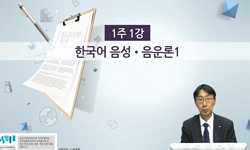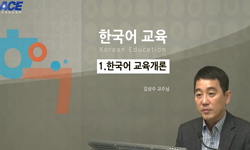This study explores the epistemological beliefs of pre-service elementary teachers in Korean language education and their impact on performance assessment task planning. Grounded in the correlation between teachers’ beliefs and instructional approac...
http://chineseinput.net/에서 pinyin(병음)방식으로 중국어를 변환할 수 있습니다.
변환된 중국어를 복사하여 사용하시면 됩니다.
- 中文 을 입력하시려면 zhongwen을 입력하시고 space를누르시면됩니다.
- 北京 을 입력하시려면 beijing을 입력하시고 space를 누르시면 됩니다.

Unveiling Pre-Service Teachers’ Epistemological Beliefs in the Planning of Korean Language Assessment
한글로보기https://www.riss.kr/link?id=A108894603
- 저자
- 발행기관
- 학술지명
- 권호사항
-
발행연도
2023
-
작성언어
English
- 주제어
-
등재정보
KCI등재
-
자료형태
학술저널
- 발행기관 URL
-
수록면
139-172(34쪽)
- DOI식별코드
- 제공처
-
0
상세조회 -
0
다운로드
부가정보
다국어 초록 (Multilingual Abstract)
This study explores the epistemological beliefs of pre-service elementary teachers in Korean language education and their impact on performance assessment task planning. Grounded in the correlation between teachers’ beliefs and instructional approaches, the research aims to redefine Schommer’s (1990) epistemological dimensions in tasks designed by pre-service teachers. Data from 150 participants were analyzed quantitatively and qualitatively, revealing three belief-based clusters: Naive (24.7%), Mixed (51.3%), and Sophisticated (24.0%). Task planning patterns in all groups focus on individual perspective analysis and selfreflection. The Mixed group emphasizes related readings, exposing participants to various perspectives. In contrast, the Naive group employs diverse tasks in multiple sessions, emphasizing critical interpretation and real-life situations. The Sophisticated group chooses perspectives from given texts, relying on textbooks or worksheets. Understanding how these beliefs are shaped or regulated during the assessment task planning informs the intersection of educational philosophy and practical application, laying the groundwork for well-informed educational practices and a nuanced understanding of epistemological beliefs.
참고문헌 (Reference)
1 김은정 ; 신명경 ; 성기석, "초등학교 학생과 초등교사의 과학에 대한 인식론적 신념에 대한 탐색적 분석" 한국현장과학교육학회 14 (14): 441-454, 2020
2 박기용, "초등예비교사의 인식론적 신념과 수업계획 행동의 연관성 탐색" 한국교육과정학회 36 (36): 25-44, 2018
3 김남훈 ; 여상인, "초등교사의 과학 수업에 대한 인식론적 신념 -성별과 교직 경력을 중심으로-" 한국과학교육학회 42 (42): 277-287, 2022
4 이수진, "초등 국어과 수행평가의 현황과 과제" 국어교육학회 (32) : 33-65, 2008
5 오선아 ; 이순덕, "예비교사의 인식론적 신념과 자기규제학습능력이 구조화·비구조화 문제 해결에 미치는 효과" 한국교원교육학회 30 (30): 75-99, 2013
6 박기용, "교육실습을 통한 초등예비교사의인식론적 신념과 수업 개념의 변화 양상 분석" 학습자중심교과교육학회 18 (18): 109-126, 2018
7 유상희 ; 민병곤 ; 정혜승, "교육과정-수업-평가의 일체화를 중심에 둔교사의 최적화 행동 연구: 국어 수업에서 ‘구성적 불일치’ 사례를 바탕으로" 한국교육과정학회 39 (39): 61-90, 2021
8 조자경 ; 박기용 ; 강이철, "교사의 인식론적 신념과 수업설계 행위와의 관련성 탐색" 한국교육공학회 25 (25): 1-33, 2009
9 Sandoval, W. A., "Understanding and promoting thinking about knowledge : Origins, issues, and future directions of research on epistemic cognition" 40 (40): 457-496, 2016
10 Maggioni, L., "The role of teacher epistemic cognition, epistemic beliefs, and calibration in instruction" 20 : 445-461, 2008
1 김은정 ; 신명경 ; 성기석, "초등학교 학생과 초등교사의 과학에 대한 인식론적 신념에 대한 탐색적 분석" 한국현장과학교육학회 14 (14): 441-454, 2020
2 박기용, "초등예비교사의 인식론적 신념과 수업계획 행동의 연관성 탐색" 한국교육과정학회 36 (36): 25-44, 2018
3 김남훈 ; 여상인, "초등교사의 과학 수업에 대한 인식론적 신념 -성별과 교직 경력을 중심으로-" 한국과학교육학회 42 (42): 277-287, 2022
4 이수진, "초등 국어과 수행평가의 현황과 과제" 국어교육학회 (32) : 33-65, 2008
5 오선아 ; 이순덕, "예비교사의 인식론적 신념과 자기규제학습능력이 구조화·비구조화 문제 해결에 미치는 효과" 한국교원교육학회 30 (30): 75-99, 2013
6 박기용, "교육실습을 통한 초등예비교사의인식론적 신념과 수업 개념의 변화 양상 분석" 학습자중심교과교육학회 18 (18): 109-126, 2018
7 유상희 ; 민병곤 ; 정혜승, "교육과정-수업-평가의 일체화를 중심에 둔교사의 최적화 행동 연구: 국어 수업에서 ‘구성적 불일치’ 사례를 바탕으로" 한국교육과정학회 39 (39): 61-90, 2021
8 조자경 ; 박기용 ; 강이철, "교사의 인식론적 신념과 수업설계 행위와의 관련성 탐색" 한국교육공학회 25 (25): 1-33, 2009
9 Sandoval, W. A., "Understanding and promoting thinking about knowledge : Origins, issues, and future directions of research on epistemic cognition" 40 (40): 457-496, 2016
10 Maggioni, L., "The role of teacher epistemic cognition, epistemic beliefs, and calibration in instruction" 20 : 445-461, 2008
11 Yadav, A., "The role of epistemological beliefs in preservice teachers’ interpretation of video cases of early-grade literacy instruction" 15 (15): 335-361, 2007
12 Bock, A. K., "The influence of teacher epistemology and practice on student engagement in literacy learning" 40 (40): 138-153, 2015
13 Atlı, H. H., "The contribution of personal epistemological beliefs to uptake in in-service professional development : A case-study" 0 (0): 1-19, 2021
14 Schommer, M., "Synthesizing epistemological belief research : tentative understandings and provocative confusions" 6 (6): 293-319, 1994
15 Cho, Y., "Secondary school teachers’ epistemological beliefs and their relationship with teacher efficacy and instructional strategies" 16 (16): 1-20, 2008
16 Ministry of Education, "Revised Korean language education instructional guidance"
17 Ubaque-Casallas, D. F., "Re-signifying teacher epistemologies through lesson planning : A study on language student teachers" 22 (22): 131-144, 2020
18 Creswell, J. W., "Qualitative inquiry research design: Choosing among five approaches" Sage 2013
19 Yilmaz, H., "Pre-service teachers’ epistemological beliefs and conceptions of teaching" 36 (36): 73-88, 2011
20 Ketabi, S., "Pre-service English teachers’ epistemological beliefs and their conceptions of teaching" 3 (3): 3-12, 2014
21 Cheon, G., "Performance assessment for reading" 100 : 201-224, 1999
22 Cheon, G., "Performance assessment and portfolio of Korean language arts" Kyoyookbook 2001
23 Viholainen, A., "Mathematics student teachers’ epistemological beliefs about the nature of mathematics and the goals of mathematics teaching and learning in the beginning of their studies" 10 (10): 159-171, 2017
24 Newell, G. E., "High school English language arts teachers’ argumentative epistemologies for teaching writing" 49 (49): 95-119, 2014
25 Chenitz, W. C., "From practice to grounded theory: Qualitative research in nursing" Addison-Wesley 1986
26 Wolf, K. P., "From informal to informed assessment : Recognizing the role of the classroom teacher" 36 (36): 518-523, 1993
27 Schommer-Aikins, M., "Explaining the epistemological belief system : Introducing the embedded systemic model and coordinated research approach" 39 (39): 19-29, 2004
28 Schommer, M., "Epistemological development and academic performance among secondary students" 85 (85): 406-411, 1993
29 Bromme, R., "Epistemological beliefs are standards for adaptive learning : A functional theory about epistemological beliefs and metacognition" 5 : 7-26, 2010
30 Mpofu, N., "English language teaching in teacher education : A personal epistemology account" 15 (15): 89-106, 2021
31 Schommer, M., "Effects of beliefs about the nature of knowledge on comprehension" 82 (82): 498-504, 1990
32 Soleimani, N., "ELT teachers’ epistemological beliefs and dominant teaching style : A mixed method research" 5 : 1-20, 2020
33 Lunn Brownlee, J., "Changing teachers’ epistemic cognition : A new conceptual framework for epistemic reflexivity" 52 (52): 242-252, 2017
34 Strauss, A., "Basics of qualitative research: Techniques and procedures for developing grounded theory" Sage 1998
35 Scardamalia, M., "Advances in applied psycholinguistics (Vol. 2): Reading, writing, and language learning" Cambridge University Press 142-175, 1987
36 Jang, Y., "A study on the relationship between epistemological beliefs and learner-centered teaching orientation of the elementary school teachers" 26 (26): 27-48, 2019
동일학술지(권/호) 다른 논문
-
A Study on Korean Language Teachers’ Perceptions about Fairness Education
- 국어교육학회
- 김정은
- 2023
- KCI등재
-
- 국어교육학회
- 장성민
- 2023
- KCI등재
-
- 국어교육학회
- 송창경
- 2023
- KCI등재
-
A Comparative Analysis of Lexical Bundles in Native and Non-Native Argumentative Writing Using Hedge
- 국어교육학회
- 유민애
- 2023
- KCI등재




 KCI
KCI KISS
KISS






